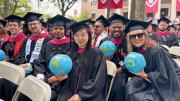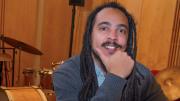The day Harvard sent out its admission decisions, I conveniently found myself at a church. The volunteer group that I had just been to Honduras with had regrouped for a photo-swapping event in St. Thomas’s bingo hall. Before I left, I ducked into the darkened church itself. “Please God please God please God please God,” I repeated silently, over and over, praying for an acceptance that would lead to experiences I couldn’t anticipate and opportunities I couldn’t name—but wanted so badly to be mine. My leg shook as I held down the gas pedal on my drive home. Upon opening and then comprehending the e-mail that welcomed me into the class of 2009, I broke into fat and sloppy tears.
It’s hard to imagine how I would have reacted if I had been rejected. Getting into Harvard was the only dream I had for myself; if I got in, I figured, other successes would follow. If I didn’t, they might not. Being accepted also seemed something like a personal success insurance policy: if all else failed, and little came of my life, at I least I could say I went to Harvard. Not getting in seemed to me a failure that would forever deny me confidence in my own abilities.
I began my job as an admissions-office tour guide at the end of my freshman year, quickly learning that we work hardest during the summer. Waves of families come to Cambridge then, visiting the school as one of several stops along a son or daughter’s junior-year college-tour circuit.
The tour moments that I enjoy most arise from the simplest of questions. “Why did you choose Harvard?” I’m often asked. I try to give the same answers to parents and to students alike. “Looking back now,” I say, “I really don’t know how I could have made anything but a gut decision, given that all the things I like about college—my friends, my classes, my professors—are things that I couldn’t have anticipated in advance.” I follow with an admission that has only recently become clear to me: “So I wonder if I would have been happy anywhere, but I chose Harvard because it seemed like the place where I most wanted to spend four years of my life.”
Parents latch onto what I’m trying to hint at, even if it escapes their children: that Harvard is a great school, of course, but it is also just like any other school in the sense that my experience at Harvard has been defined by the friends I’ve made, the classes I’ve taken, and the ways I’ve spent my time, rather than by Harvard’s reputation. Parents seem to appreciate this approach—I’ll see a few of them nod in agreement—and I like being in cahoots with them. I just wish I’d thought this way four years ago.
In August, I spent a week in Shanghai teaching The Great Gatsby to four groups of high-achieving, English-speaking Chinese students. One of my goals for my students was to have them understand that dreams are not inherently good and that their value instead depends on their influence on the person pursuing them. In the spirit of the Olympics, gold-medal swimmer Michael Phelps was my example of someone with a “good” dream. I read to my students a New York Times report that Phelps’s third-grade teacher had recently written to him, proud that he had so clearly found the right goal to focus on despite having struggled in school. Because Phelps had a “good” dream, I told my students, he was able to do something truly great.
Jay Gatsby, of course, was my example of someone with a “bad” dream. I explained to my students that his desire to win Daisy led him to make his money illegally and, once reunited with her, refuse to see her as any different from the young girl he once fell in love with. Gatsby’s dream skewed his perception of success and dictated the course of his life.
But as I began this lesson on dreams for my third seminar group, a new thought came to mind. It didn’t fit so well into my established lesson plan as Jay Gatsby did, but I thought it might make more of an impression on my students. “Actually,” I said, “you know what? I think I know of another bad dream. My dream of going to Harvard was a bad dream because it meant more to me than any dream should.”
I elaborated: My dream to go to Harvard was a bad dream because I had staked my self-esteem and my hopes for my future on an external situation I had little control over. For the first time, I realized that I was little different from Gatsby but for fortunate treatment in the college admissions pool.
I used myself as an example because it was hard not to see something of myself in some of the students, and I was worried that they were beginning to define themselves, as I had done, by their prospects of going to a good school. Sometimes the reminders of my younger self were jarring: while helping one student make sense of the format of the college admissions Common Application, I showed her my own “Activity List,” prepared for my college applications and still on my computer. Hearing another student explain how she learned English by playing a tape each morning and reciting along with it as she got ready made me think of the Great Courses tapes I checked out of my community college’s library and listened to as I drove home. “Please apply to Harvard,” I begged after a long conversation with her. Just don’t, I thought to myself, want to get in as badly as I did.
This summer, as young girls in my tour group singled me out to ask questions about journalism on campus and I met Chinese students whose lack of opportunities in their hometowns made them all the more determined to seek new challenges in a new place, I’ve had the opportunity to rethink my own path to and experiences at Harvard. I understand completely how the students who arrive at the admissions office feel—shy, terrified, and entranced by Harvard—because I, too, once was an 18-year-old who could barely say “Harvard” aloud. And I think I can relate to the Chinese students who believe that the reputation that comes with going to Harvard—or any school in the United States—will provide them with a safety net of success should life ever prove difficult for them in the future.
Three and a half years since issuing my urgent—and fervent—pleas to a higher power from the nave of St. Thomas church, I’ve discovered many of the opportunities going to Harvard brings and the experiences it offers. But just as three years of Friday-night outings with my roommates, intersession trips, lectures in Sever 113, and conversations in the Barker Center have become the Harvard experience I speak of fondly and enthusiastically during my tours, late-night tears over a project started too late, a heart too easily hurt, or other, smaller, dreams not realized have also made it easier for me to speak of Harvard critically, even dismissively. Though I now know the joys of a Harvard education, I also know its occasional sorrows and frequent frustrations. And just as I certainly understand having an unrelenting desire to go to one’s college of choice, I also now see a certain pointlessness in such passion.
This is why I wanted my Chinese students to think about both Michael Phelps and Jay Gatsby, and why I give admission tours—I want to share with these 16-, 17-, and 18-year-olds what it’s taken me three years to learn. Getting into Harvard turned out to be easy and, in a sense, unimportant. It’s growing up that’s been the challenge.








